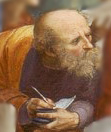Apieron - boundless
https://iep.utm.edu/anaximander/
I believe this is Michael Angelo's depiction of Anaximander, from his mural in the Vatican. The mural is usually referred to as the School of Athens, but its actual name is Knowledge of Causes
"Anaximander was the author of the first surviving lines of Western philosophy. He speculated and argued about “the Boundless” as the origin of all that is. He also worked on the fields of what we now call geography and biology. Moreover, Anaximander was the first speculative astronomer. He originated the world-picture of the open universe, which replaced the closed universe of the celestial vault.
His work will always remain truncated, like the mutilated and decapitated statue that has been found at the market-place of Miletus and that bears his name. Nevertheless, by what we know of him, we may say that he was one of the greatest minds that ever lived. By speculating and arguing about the “Boundless” he was the first metaphysician. By drawing a map of the world he was the first geographer. But above all, by boldly speculating about the universe he broke with the ancient image of the celestial vault and became the discoverer of the Western world-picture."
"According to Aristotle and Theophrastus, the first Greek philosophers were looking for the “origin” or “principle” (the Greek word “archê” has both meanings) of all things. Anaximander is said to have identified it with “the Boundless” or “the Unlimited” (Greek: “apeiron,” that is, “that which has no boundaries”). Already in ancient times, it is complained that Anaximander did not explain what he meant by “the Boundless.” More recently, authors have disputed whether the Boundless should be interpreted as spatially or temporarily without limits, or perhaps as that which has no qualifications, or as that which is inexhaustible. Some scholars have even defended the meaning “that which is not experienced,” by relating the Greek word “apeiron” not to “peras” (“boundary,” “limit”), but to “perao” (“to experience,” “to apperceive”)."
Another word for unknown, like"singularity" and "dark".
Never the less, to move from a celestial "vault", like a dome of stars, is a significant paradigm shift. By what evidence might Anaximander have made this egregious speculation?
"Aristotle reports a curious argument, which probably goes back to Anaximander, in which it is argued that the Boundless has no origin, because it is itself the origin. We would say that it looks more like a string of associations and word-plays than like a formal argument. It runs as follows: “Everything has an origin or is an origin. The Boundless has no origin. For then it would have a limit. Moreover, it is both unborn and immortal, being a kind of origin. For that which has become has also, necessarily, an end, and there is a termination to every process of destruction” (Physics 203b6-10, DK 12A15)."
There you go. Apieron is, by definition, the origin, therefore, it has no origin itself. The bottom of the turtle pile, so to speak.
Anaximander is a very interesting historical character to read about. Student of Thales, I believe he is the one who told Pythagoras to seek out the Egyptian's for his education.
-Will











